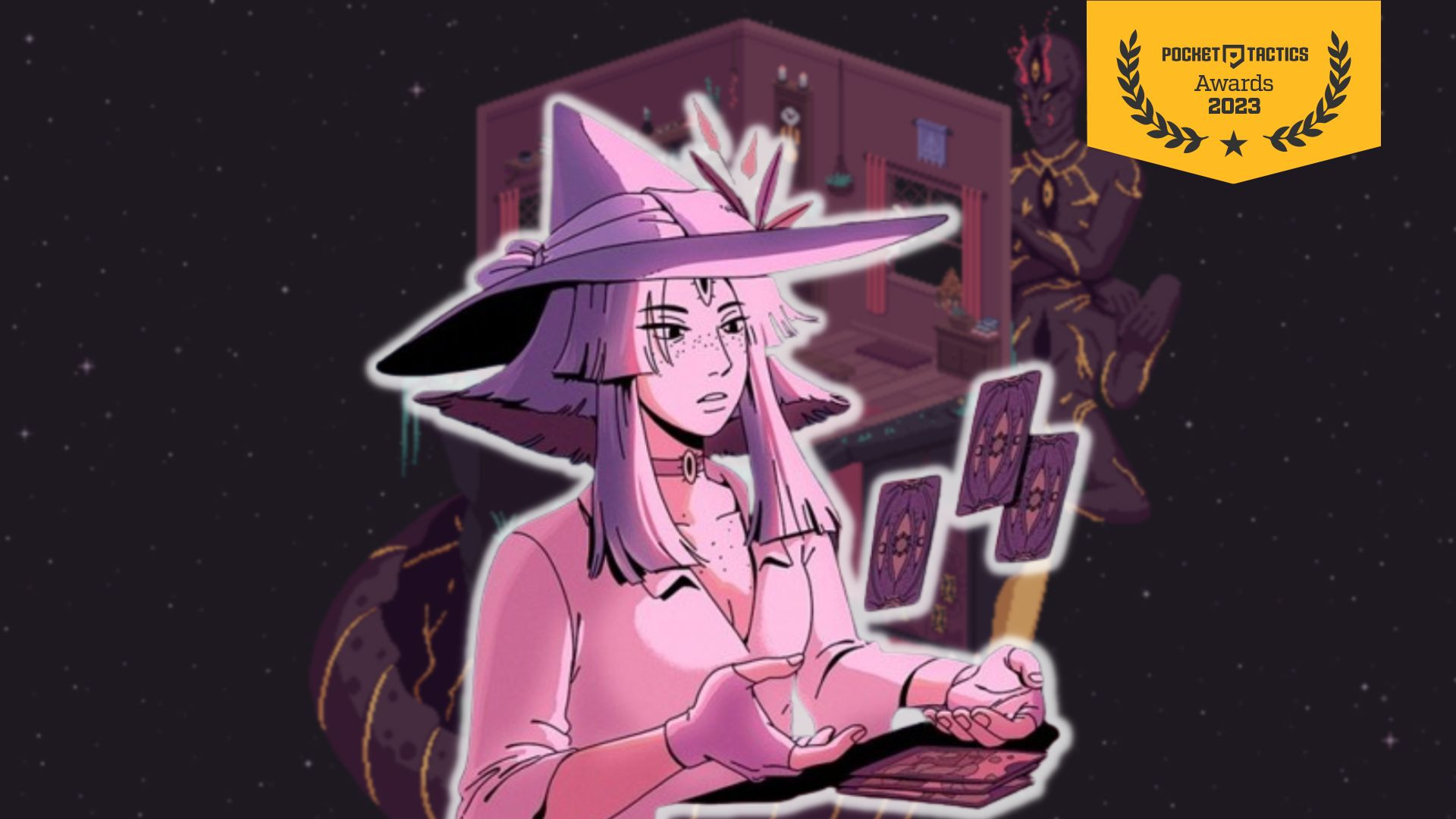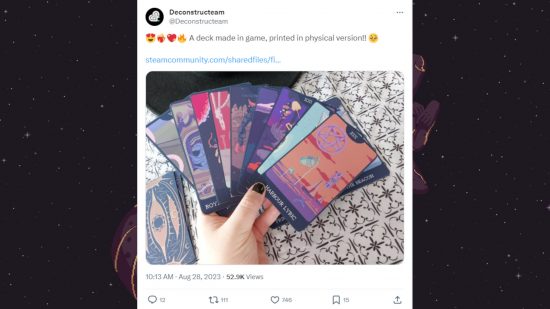
I know for a fact that I’m not the only person online who’s noticed the recent uptick in tarot references in media, particularly in videogames. From my own research, I know that tarot motifs appear in franchises like Persona and Dragon Age, often tied to specific characters and their traits, but more and more titles are leaning into the esoteric divination practice in one way or another.
Featuring tarot and other forms of divination in TV, films, and games is nothing new and actually goes hand in hand with some not-so-appropriate representations of minority cultures, specifically of Roma people and other traveling cultures. Even if you’ve not seen the tarot episode of Netflix’s Chilling Adventures of Sabrina or played The Quarry, you’ve most likely seen Esmerelda from The Hunchback of Notre Dame (either in the film or in Kingdom Hearts). Tarot and its surrounding culture have been represented and misrepresented for decades.
As a witchcraft practitioner, I aim to be as mindful of my practice as possible, taking care to avoid closed practices (spells and other rituals that only certain groups of people can do) and learn about where aspects of the craft come from. This has led to me learning a lot about the muddy history of tarot, its ties to the Roma community, and the aforementioned demonization of traveling communities in media. Because of this, I pay a lot of attention when tarot shows up in a game that I like, and I’ve noticed that it’s getting more frequent.
Games are beginning to get more creative with their tarot references, moving beyond the fairly straightforward connections that Dragon Age and Persona make between characters and cards through profile imagery and social links. Roguelike games like Cult of the Lamb and The Binding of Isaac take the idea of a symbolic cartomancy system (cartomancy means divination through cards, I’ll touch on this more later) and use it to represent equippable buffs. The cards you find or purchase directly impact certain aspects of your dungeon run, as if the cards are showing you a glimpse of the future and leaving you better prepared to face its challenges.
You get to read Alex’s tarot in Life Is Strange: True Colors chapter three, and this serves as a midway check-in to assess the choices you’ve made so far throughout the story. The cards reveal information about Alex, the larger plot, and your romance choices, and this scene reminded me of how I personally use the cards to help me puzzle through important decisions and life events.
Sayonara Wild Hearts also takes the tarot motif in a new direction, using the overarching story of the major arcana, The Fool’s Journey, as a narrative structure. Plus, it does all this with only a brief voiceover – the rest of the story is carried through the game’s incredible soundtrack and visuals. This game serves as a reminder that tarot cards are more than just standalone symbols. They weave together to form a larger story about the journey from naivety to knowledge, and from birth to death and rebirth, which is often overlooked in other media that use tarot.
My personal favorite representation of tarot in videogames came out this year (it also features in our indie games of the year 2023 list) and puts you right in the driver’s seat of divination. The Cosmic Wheel Sisterhood from Deconstructeam and Devolver Digital tells the story of Fortuna, a divination witch who’s been exiled from her coven and banned from reading the tarot after she foretold the fall of witchy society. Surprisingly, very few games that feature tarot cards or symbolism actually let you practice divination, which is just the first of this game’s refreshing features.

Sure, you technically get to read Alex’s fortune in True Colors, but in reality, the card’s meanings are simply shown to you. The Cosmic Wheel Sisterhood not only simulates the act of shuffling the cards, asking a question, and drawing but also lets you choose how to interpret the answer. The meaningful part of tarot or any other form of cartomancy – which has existed in some form across many cultures for centuries before we all seemingly settled on the Rider-Waite-Smith tarot deck – is not the cards you draw, but how you interpret them.
While some parts of The Cosmic Wheel Sisterhood’s story use the traditional tarot deck, the majority of the game focuses on you as Fortuna building a completely new deck of cards to get around the terms of your exile. Not only does this force you to spend more time with the meaning and symbolism of each card as you painstakingly move art assets around to create your masterpiece, but it also avoids any accusations of cultural appropriation or breaking closed practice. The jury is out on whether or not tarot counts as a closed practice, so using a deck of cards that is fully removed from the established system means you can engage with similar themes without stepping on any toes.
As I mentioned before, each time you read the cards you actually get to choose how Fortuna interprets them. You can go about this in two ways – either the ‘gameified’ way, seeing which answers give you more elemental particles that you need to make new cards, or simply by picking the answer that feels right to you. After all, you made the cards, so you have the final say on what they mean. Deconstructeam has even encouraged players to print off and use their decks from the game, sharing a Steam post and granting everyone permission as “It’s your cards, you made them!”

Overall, I’m really enjoying seeing tarot and other forms of cartomancy and divination making appearances in videogames (don’t get me started on how desperately I want Loose Leaf to come to Switch or mobile). Developers and writers are starting to engage more deeply in what the cards mean and what it means to read them, while exploring new and creative ways to find meaning in the world around us. The Cosmic Wheel Sisterhood literally lets you imbue art with meaning and send it out into the world, and I’m sure plenty more games will continue the trend.
If you’re looking for more soft and soulful experiences, check out our feature on cozy games. We’ve got a ton of content covering the games I’ve mentioned here, including a list of all the Persona games on Switch, news of the Cult of the Lamb Sins of the Flesh DLC, and our heartwrenching Life is Strange: True Colors Switch feature from last year.